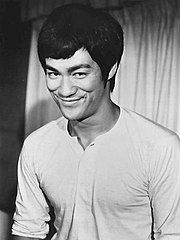 People remember Bruce Lee as a fighter or as a movie star. But as it happens, he was also a thoughtful man. Bruce had his gaps and flaws, of course, but he also left behind a lot of useful thoughts. And since so few people know about these ideas, I’ll cover them here. (I never knew Bruce, who died while I was a teenager, but a friend of mine did, and a friend of another friend knew him very well.)
People remember Bruce Lee as a fighter or as a movie star. But as it happens, he was also a thoughtful man. Bruce had his gaps and flaws, of course, but he also left behind a lot of useful thoughts. And since so few people know about these ideas, I’ll cover them here. (I never knew Bruce, who died while I was a teenager, but a friend of mine did, and a friend of another friend knew him very well.)
Bruce forged most of his ideas while developing and testing martial arts. In other words, his ideas came from direct application to the real world; they faced hard, objective standards. If he stuck to some old technique, merely because of its pedigree, he was likely to be hurt. That’s a must-learn environment, and it refines ideas in a hurry.
The truth is that many people, especially in our time, seek to escape objective standards: they don’t want to get slapped, and especially not to be shown wrong. But there’s a huge problem with people evading pain in that way: They simultaneously escape learning, and ultimately fail to develop wisdom.
And so it’s no real surprise that people who consistently face-off against objective standards (not just fighters, but people like engineers), tend to see the world more clearly that those who escape them.
Bruce sometimes did the “Zen thing” of being intriguingly vague, but that can have its place too. And yes, Bruce could also be a performer. In his case, however, that affected delivery much more than it did substance.
And so I’ll begin with a thought that perhaps should set the tone for this collection. I’ll quote Bruce in italics, followed by my comments:
Use only that which works, and take it from any place you can find it.
I once learned something from a filthy, smelly drunk on a train platform, and I’d be pleased to do so again. Truth stands independent of source, and there is scarcely an adult on the planet from whom we couldn’t learn something if we tried long enough.
Man, the living creature, the creating individual, is always more important than any established style or system.
What Bruce is saying is that we are primaries, and not secondaries. We should never see ourselves as derivatives of a collective; we are, and ought to be, of independent mind and value.
The meaning of life is that it is to be lived, and it is not to be traded and conceptualized and squeezed into a pattern of systems.
Again, cultures come from us; we don’t come from them. What matters about life is what comes out of us, not what comes to us.
Balance your thoughts with action. — If you spend too much time thinking about a thing, you’ll never get it done.
Long talk and planning are often excuses for not acting; tools for the evasion of action.
In life, what more can you ask for than to be real? To fulfill one’s potential instead of wasting energy on [attempting to] actualize one’s dissipating image, which is not real and an expenditure of one’s vital energy.
A very important point: people spend far more energy trying to appear good to others (“actualizing an image”) than actually being good. They do this because being good means to be a separate individual, and to lose the safety of the pack.
From here on, I’ll post Bruce’s thoughts, without comment. Take whatever you can from them.
What you habitually think largely determines what you will ultimately become.
Don’t fear failure. — Not failure, but low aim, is the crime. In great attempts it is glorious even to fail.
A fight is not won by one punch or kick. Either learn to endure or hire a bodyguard.
The classical man is just a bundle of routine, ideas and tradition. If you follow the classical pattern, you are understanding the routine, the tradition, the shadow — you are not understanding yourself.
Do not deny the classical approach, simply as a reaction, or you will have created another pattern and trapped yourself there.
If one loves, one need not have an ideology of love.
If nothing within you stays rigid, outward things will disclose themselves.
Reality is apparent when one ceases to compare. — There is “what is” only when there is no comparison at all, and to live with what is, is to be peaceful.
A self-willed man obeys a different law, the one law I, too, hold absolutely sacred — the human law in himself, his own individual will.
Like everyone else you want to learn the way to win, but never to accept the way to lose — to accept defeat. To learn to die is to be liberated from it.
Know the difference between a catastrophe and an inconvenience.
Cease negative mental chattering. — If you think a thing is impossible, you’ll make it impossible. Pessimism blunts the tools you need to succeed.
**
Paul Rosenberg
freemansperspective.com
